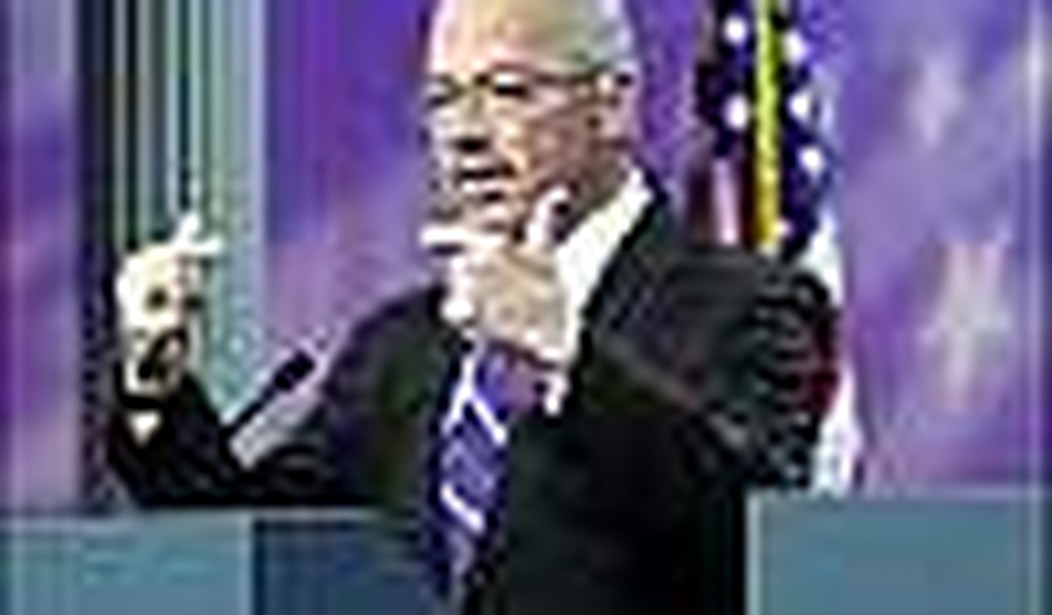While a raft of presidential candidates have queued up to joust on the political playing field, each offering voters their own roadmap to a New Day of Change in the way our federal government operates, Libertarian hopeful Bob Barr has had his feet planted firmly in the past.
Far from being some sort of Luddite, Barr seeks a return to that which he has long held as the fundamental principle of conservatism: when the subject turns to governance, less is more.
Looking back upon his time as a conservative Republican in Congress, the candidate told this reporter during a recent conference call, “We no longer have representatives from either major party who have any serious interest in reducing the size of government, cutting taxes, or getting spending under control.”
This is a salable sentiment among paleoconservatives, but some may wonder precisely how much one person — even when seated in the Oval Office — could accomplish toward such lofty goals. Barr insists that the very presence in the West Wing of an apostate from the two party system would send out a clarion call, shocking Congress into action. He also promised to lead by example, mandating a 10% cut in spending by the executive branch on his first day in office. This, he assured us, would be followed by a meeting with both houses of Congress where he would shame them into following suit.
I recently spoke with Derek Barr, the candidate’s son and a campaign spokesman. He observed:
“When you have a Republican president who goes and meets behind closed doors with Republicans, or a Democratic president who meets behind closed doors with Democrats, nothing ever gets done. When Bob meets with all of them, Congress is going to see the writing on the wall. A Libertarian has just been elected president — the first time a third party candidate has done this in more than a century. In two, four or six years, their time is coming up.”
Derek went on to tell me that his father would also call on Congress to join him in a comprehensive review of every governmental department and entitlement program to determine which were constitutionally valid. Those failing to pass muster would be scheduled for termination, shifting those functions back to the several states. Barr clearly places his trust in the Founding Fathers when determining which matters should properly pry open the public purse.
While the congressman’s thrifty attitude should rightly garner approbation among the GOP faithful, he maintains other positions which run afoul of current Republican doctrine. On the subject of Iraq, for example, Barr promised that he would begin a prompt, safe, responsible withdrawal from the country. He feels that the invasion and occupation were “two separate mistakes” and our continued presence acts as an enabler of Iraqi dependence on external, widely unpopular forces, while doing nothing to enhance our own security.
Further, he plans on completely retooling America’s military strategy abroad. Barr indicated that the United States could significantly reduce spending by putting the “defense” back into the Department of Defense. He would drastically reduce the number of foreign bases we maintain, along with cuts in overseas troop levels, while strengthening our defensive position at home. Reductions in foreign aid were also proposed. I found some of these positions quite similar to proposals from the Democrats.
Even on the domestic front, Barr has adopted a number of uniquely Libertarian policies geared toward keeping the government “out of our business.” Some of these deal with aggressive positions on personal privacy and diversity, such as the recent “flawed” FISA legislation and his belief that gay marriage is an issue for the states to decide. While previously a strong pro-life Republican, the Libertarian edition of Bob Barr has remained largely silent on the abortion issue during interviews and stump speeches. These platform planks will further dampen support among traditional conservative enthusiasts.
The campaign seems under no illusions about their chance of victory, describing it to me as “a long, hard hill to climb,” but continues to insist they are in this race to win. In terms of ballot access, Barr has already defied some early expectations. With a recent court victory in Ohio they are now on track to appear on the ballots of 49 states and the District of Columbia, with only Oklahoma leaving Bob out in the cold. In state by state surveys he has managed to score as high as 5% in a few places, including his home stomping grounds of Georgia. While victory may currently appear out of reach, many states are shaping up to be a photo finish between Obama and McCain. Bob Barr may well have more of an impact on the 2008 presidential election than many would have suspected or desired.









Join the conversation as a VIP Member